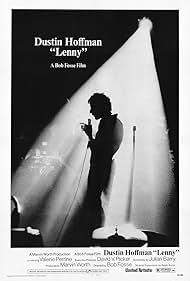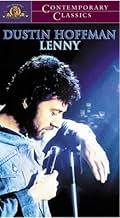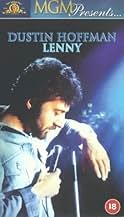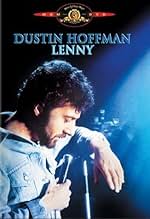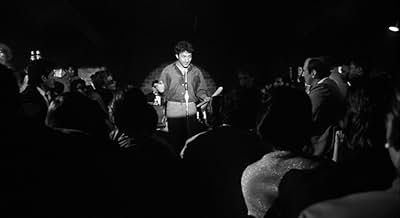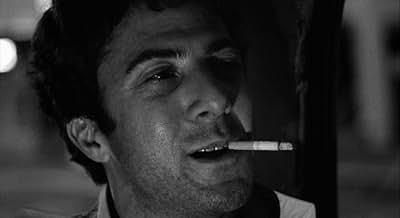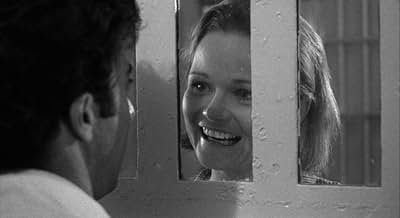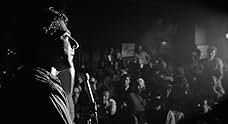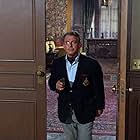PUNTUACIÓN EN IMDb
7,5/10
18 mil
TU PUNTUACIÓN
La historia del cómico de los 60 Lenny Bruce, cuyo estilo de comentario social rompió barreras y fue considerado, en su momento, como demasiado obsceno para el público.La historia del cómico de los 60 Lenny Bruce, cuyo estilo de comentario social rompió barreras y fue considerado, en su momento, como demasiado obsceno para el público.La historia del cómico de los 60 Lenny Bruce, cuyo estilo de comentario social rompió barreras y fue considerado, en su momento, como demasiado obsceno para el público.
- Nominado para 6 premios Óscar
- 7 premios y 17 nominaciones en total
Kathryn Witt
- Girl
- (as Kathie Witt)
Monroe Myers
- Hawaiian Judge
- (as Monroe Meyers)
Reseñas destacadas
This biopic about shock comedian Lenny Bruce was Bob Fosse's followup to his well-received 1972 film "Cabaret." I'm pretty sure that "Lenny" was a financial bomb, and I'm not surprised. It's a relentlessly depressing and ugly film, despite the stylish polish Fosse gives it. Anyone who has seen Fosse's last film, "Star 80," knows just how nihilistic this director could be, and "Lenny" shows evidence of that.
It is a fascinating film though, in its own way. Fosse uses a documentary-like approach, complete with black and white photography and a narrative device in which we see Bruce's long-suffering love (played heartbreakingly by Valerie Perrine, Lex Luthor's bikini-clad girlfriend in "Superman" [1978]) telling Bruce's story to a filmmaker while the actual events themselves are played out as flashbacks. Fosse was fond of this confessional type of storytelling and would use it again in "All That Jazz" (1979). Dustin Hoffman is simply sensational as Bruce; he utterly disappears into this caustic character until no trace of Hoffman the actor is left. Technically, everything about the film is highly accomplished, but it's so desolately grim as to be off putting.
Grade: B+
It is a fascinating film though, in its own way. Fosse uses a documentary-like approach, complete with black and white photography and a narrative device in which we see Bruce's long-suffering love (played heartbreakingly by Valerie Perrine, Lex Luthor's bikini-clad girlfriend in "Superman" [1978]) telling Bruce's story to a filmmaker while the actual events themselves are played out as flashbacks. Fosse was fond of this confessional type of storytelling and would use it again in "All That Jazz" (1979). Dustin Hoffman is simply sensational as Bruce; he utterly disappears into this caustic character until no trace of Hoffman the actor is left. Technically, everything about the film is highly accomplished, but it's so desolately grim as to be off putting.
Grade: B+
To be honest I don't think the rest of the film quite deserves 8 stars, but Dustin Hoffman's performance as Lenny Bruce is so extraordinary that it lifts the movie up to that rating.
Made in a fairly familiar quasi-documentary style, 'Lenny' begins with 'present day' (i.e. 1974) interviews with the surviving characters from Lenny's life, cut with flashbacks to his 1950's beginnings as a 'traditional' comic, and 'late' live performances in his post-drug-bust days. As the film progresses and the narrative catches up with the interviews, the gaps between these segments 'close'. Clever use is made of some of Lenny's material, cutting from keywords or phrases in his bits, to events in his life with inspired or correlated to them.
All the same there is something a little dry and disappointing in the film's structure: almost as if it could have used a more conventional, linear narrative, like Milos Forman's tribute to Andy Kauffman, 'Man on the Moon' would use to such great effect 25 years later.
Ironically though, such a structure might have deprived of us of seeing more of Hoffman doing Lenny's bits 'live' on stage - and for me these were the highlights, which I wish had lasted longer, rather than flashing back to some past event after 30 seconds. As a big Lenny Bruce fan, I can only say that Hoffman's portrayal is almost supernatural. It's like he's channeling the guy. He has his mannerisms and improvisational style down perfectly. You would swear you were seeing these improvisations for the first time if you hadn't heard them already. In fact, Hoffman possibly even improves on Lenny's delivery in one small respect. Lenny had a penchant for the 'conversation' that would erupt in the middle of one of his bits, between two or more characters. Hoffman probably puts a bit more distinction between the characters than Lenny often did (quite often they would all just sound like Lenny, which was part of the magic, but never mind.) Over 30 years on, it's quite amazing to me that this film has become a relative obscurity in Dustin Hoffman's filmography. Frankly, though Hoffman has blown me away on various occasions, I don't ever remember being more blown away than this. And if you were to pick easy people to imitate, I doubt Lenny Bruce on stage would be high on many people's lists.
The film as a whole is good, but to witness Hoffman channeling Bruce, it's a must-see.
Made in a fairly familiar quasi-documentary style, 'Lenny' begins with 'present day' (i.e. 1974) interviews with the surviving characters from Lenny's life, cut with flashbacks to his 1950's beginnings as a 'traditional' comic, and 'late' live performances in his post-drug-bust days. As the film progresses and the narrative catches up with the interviews, the gaps between these segments 'close'. Clever use is made of some of Lenny's material, cutting from keywords or phrases in his bits, to events in his life with inspired or correlated to them.
All the same there is something a little dry and disappointing in the film's structure: almost as if it could have used a more conventional, linear narrative, like Milos Forman's tribute to Andy Kauffman, 'Man on the Moon' would use to such great effect 25 years later.
Ironically though, such a structure might have deprived of us of seeing more of Hoffman doing Lenny's bits 'live' on stage - and for me these were the highlights, which I wish had lasted longer, rather than flashing back to some past event after 30 seconds. As a big Lenny Bruce fan, I can only say that Hoffman's portrayal is almost supernatural. It's like he's channeling the guy. He has his mannerisms and improvisational style down perfectly. You would swear you were seeing these improvisations for the first time if you hadn't heard them already. In fact, Hoffman possibly even improves on Lenny's delivery in one small respect. Lenny had a penchant for the 'conversation' that would erupt in the middle of one of his bits, between two or more characters. Hoffman probably puts a bit more distinction between the characters than Lenny often did (quite often they would all just sound like Lenny, which was part of the magic, but never mind.) Over 30 years on, it's quite amazing to me that this film has become a relative obscurity in Dustin Hoffman's filmography. Frankly, though Hoffman has blown me away on various occasions, I don't ever remember being more blown away than this. And if you were to pick easy people to imitate, I doubt Lenny Bruce on stage would be high on many people's lists.
The film as a whole is good, but to witness Hoffman channeling Bruce, it's a must-see.
A tribute to ground-breaking comedian Lenny Bruce and - another - absolutely breathtaking performance by Dustin Hoffman (and, as is typical for that period of filmmaking, pretty much everyone of the cast).
When seventies cinema was good, it was really, really good, and it is, at least acting-wise, only rarely rivaled in contemporary productions. As a character study and also as a snap shot of an era, 'Lenny' is essential viewing. 8 stars out of 10.
In case you're interested in more underrated masterpieces, here's some of my favorites:
imdb.com/list/ls070242495
When seventies cinema was good, it was really, really good, and it is, at least acting-wise, only rarely rivaled in contemporary productions. As a character study and also as a snap shot of an era, 'Lenny' is essential viewing. 8 stars out of 10.
In case you're interested in more underrated masterpieces, here's some of my favorites:
imdb.com/list/ls070242495
... because I watched this yesterday for the first time in years, and I was less impressed than I was when I saw it in the early 80s. That's probably because I've been binging on The Marvelous Mrs. Maisel and thus have seen Luke Kirby's interpretation. Allowed to be spread out over several seasons, episodes, and situations, I just feel it is a more complete performance. But I digress.
Lenny starts out trying to do bits like any other comic of the day - the early 50s, and he fails at it. He then starts to do more commentary on the human condition as stand-up, and that's where he hits his mark. Especially at a time of great societal change like the late 50s/early 60s. Today, that's the stuff of pretty much all stand-up comics, so it's hard to appreciate just how ground-breaking it was at the time. It's like trying to appreciate how ground-breaking "Citizen Kane" was in 1941. It's still an interesting film, but it's just impossible to appreciate it as next-level filmmaking like it was at the time.
My big takeaway was that director Bob Fosse really knows how to tell a story with editing. There are sequences in all of his movies where I would say, 'Wow,' just to an editing choice. Lenny impressed me the most in that regard. As for Valerie Perrine as Lenny's wife - I think that had she been up for Best Supporting Actress Oscar instead of Best Actress, she would have won that category. She was striking as a woman who went along with the choices that her husband made for the both of them with not much if any input from her, and later got blamed by him and society for that matter for going along with those choices. In that regard, she was a more conventional wife of the 1950s than you would think.
Lenny starts out trying to do bits like any other comic of the day - the early 50s, and he fails at it. He then starts to do more commentary on the human condition as stand-up, and that's where he hits his mark. Especially at a time of great societal change like the late 50s/early 60s. Today, that's the stuff of pretty much all stand-up comics, so it's hard to appreciate just how ground-breaking it was at the time. It's like trying to appreciate how ground-breaking "Citizen Kane" was in 1941. It's still an interesting film, but it's just impossible to appreciate it as next-level filmmaking like it was at the time.
My big takeaway was that director Bob Fosse really knows how to tell a story with editing. There are sequences in all of his movies where I would say, 'Wow,' just to an editing choice. Lenny impressed me the most in that regard. As for Valerie Perrine as Lenny's wife - I think that had she been up for Best Supporting Actress Oscar instead of Best Actress, she would have won that category. She was striking as a woman who went along with the choices that her husband made for the both of them with not much if any input from her, and later got blamed by him and society for that matter for going along with those choices. In that regard, she was a more conventional wife of the 1950s than you would think.
As long as I can remember, I've been a massive fan of stand-up comedy. I think that these days there are very few comedians who are worth their weight, but the joy of watching the few who are is almost unparalleled. It's no secret that Lenny Bruce changed the face of stand-up, becoming a pioneer for such contemporaries as Louis C.K. and Bill Burr, my two favorite comedians. Bruce came into a world that was scared to speak the truth, scared to laugh at the absurdity of human behavior and he held up a mirror to the world and said, "Look at yourself, aren't you ridiculous?".
For it's time, the idea of doing this was shocking and wildly controversial. People saw him as vulgar and offensive, when he was really just speaking the truth that people were afraid to here. He evolved the game and it's only fair that an actor like Dustin Hoffman, a fellow pioneer of his career field, was selected to portray Bruce in this stark and honest biographic tale. My general stance towards Hollywood biopics is that I'm strongly against them, believing that to condense the life of a human being into a two or three hour film is impossible, but the script here by Julian Barry, adapting from his own play, does a strong job of taking the important parts of Bruce's life and leaving the rest behind.
Unfortunately it does fall into a lazy trap of this genre, using a structure that functions around post-death interviews with those closest to Bruce in order to tell the story of his rise and fall. What's interesting though is that it doesn't play it straight in the sense of going back and forth between post-death and the chronological rise of Bruce; it does do this, but it also throws in another period, Bruce's last routine on stage. This adds an interesting twist onto this worn out structure and makes watching his rise even more intriguing to witness.
We see him on stage, miraculously portrayed by Hoffman, with a full beard, exhausted expression and a wild, kinetic energy; a refusal to give up and sit down, an almost desperate need to get out all of the words he needs to say before he is stopped again. Bruce is almost a protester here, grabbing his microphone and shouting towards anyone who will listen to understand the crimes against humanity that are being permitted every day. Seeing him in this state makes it even more interesting to see where he began, as we now must wonder what happens to turn the nebbish and soft Bruce we meet in his earliest time period into the biting and confident man he will later become.
Bob Fosse directs it all with his own unique flare, and some razor-sharp editing keeps things feeling fresh and as kinetic as the man the whole thing is based around. I also want to mention the cinematography, which is honestly some of the best I've ever come across. It's presented in black and white, which was a wonderful idea to match Bruce's style as a performer, and the way that the shots are composed and lit is a visual orgasm in every way. This is one of those films that I wanted to pause every five seconds just to marvel at the way it was shot, but I couldn't allow myself to step away from seeing more of Bruce.
Everyone in the cast and crew do marvelous work here, but there's no denying that the film belongs to one man and that man is Dustin Hoffman. His performance is one of titanic proportions here, a slow-burn of pure genius, bringing Bruce along that evolutionary path to the man we know he will one day become. Lenny Bruce goes through many stages before he becomes the comedic icon that we initially see, and Hoffman plays them all with an absorbed authenticity that is purely magical. Looking back in time we see when he first meets his future wife Honey, and the utter bliss and childish joy on his face would be beautiful if it wasn't so heartbreaking knowing what he will eventually become.
It's in the later stages that Hoffman truly lifts off though, when Bruce is in and out of prison and struggling with a drug addiction. Bruce becomes a bastion for free speech and social commentary, but more the film presents him as something more human than that; a flawed creature who for all of his evolutionary changes to media was also a very broken man within himself. There is a scene where Bruce does a routine wearing nothing but a raincoat and one sock, while he's riding high on drugs, that might just be the finest piece of acting I've seen my entire life.
The scene is about ten minutes long, but it feels like it lasts an eternity. Normally this would be a complaint, but here it couldn't be a stronger compliment, as Hoffman takes us through this horrific state that the man is in at the time. With his lapses in silence, his rambling dialogues and his stop and start speech patterns, it's like watching a train wreck that you can't stare away from and you just keep hoping will be over soon. You want it to stop but you know that you aren't going to look away until it does.
This colossal feat of acting would be impressive on it's own, but the fact that Hoffman does all of it in one take makes it something truly out of this world. It's a performance that stands at the very top of the all-time greats, in a film that is as brutally honest towards Lenny Bruce as he was towards the rest of the world.
For it's time, the idea of doing this was shocking and wildly controversial. People saw him as vulgar and offensive, when he was really just speaking the truth that people were afraid to here. He evolved the game and it's only fair that an actor like Dustin Hoffman, a fellow pioneer of his career field, was selected to portray Bruce in this stark and honest biographic tale. My general stance towards Hollywood biopics is that I'm strongly against them, believing that to condense the life of a human being into a two or three hour film is impossible, but the script here by Julian Barry, adapting from his own play, does a strong job of taking the important parts of Bruce's life and leaving the rest behind.
Unfortunately it does fall into a lazy trap of this genre, using a structure that functions around post-death interviews with those closest to Bruce in order to tell the story of his rise and fall. What's interesting though is that it doesn't play it straight in the sense of going back and forth between post-death and the chronological rise of Bruce; it does do this, but it also throws in another period, Bruce's last routine on stage. This adds an interesting twist onto this worn out structure and makes watching his rise even more intriguing to witness.
We see him on stage, miraculously portrayed by Hoffman, with a full beard, exhausted expression and a wild, kinetic energy; a refusal to give up and sit down, an almost desperate need to get out all of the words he needs to say before he is stopped again. Bruce is almost a protester here, grabbing his microphone and shouting towards anyone who will listen to understand the crimes against humanity that are being permitted every day. Seeing him in this state makes it even more interesting to see where he began, as we now must wonder what happens to turn the nebbish and soft Bruce we meet in his earliest time period into the biting and confident man he will later become.
Bob Fosse directs it all with his own unique flare, and some razor-sharp editing keeps things feeling fresh and as kinetic as the man the whole thing is based around. I also want to mention the cinematography, which is honestly some of the best I've ever come across. It's presented in black and white, which was a wonderful idea to match Bruce's style as a performer, and the way that the shots are composed and lit is a visual orgasm in every way. This is one of those films that I wanted to pause every five seconds just to marvel at the way it was shot, but I couldn't allow myself to step away from seeing more of Bruce.
Everyone in the cast and crew do marvelous work here, but there's no denying that the film belongs to one man and that man is Dustin Hoffman. His performance is one of titanic proportions here, a slow-burn of pure genius, bringing Bruce along that evolutionary path to the man we know he will one day become. Lenny Bruce goes through many stages before he becomes the comedic icon that we initially see, and Hoffman plays them all with an absorbed authenticity that is purely magical. Looking back in time we see when he first meets his future wife Honey, and the utter bliss and childish joy on his face would be beautiful if it wasn't so heartbreaking knowing what he will eventually become.
It's in the later stages that Hoffman truly lifts off though, when Bruce is in and out of prison and struggling with a drug addiction. Bruce becomes a bastion for free speech and social commentary, but more the film presents him as something more human than that; a flawed creature who for all of his evolutionary changes to media was also a very broken man within himself. There is a scene where Bruce does a routine wearing nothing but a raincoat and one sock, while he's riding high on drugs, that might just be the finest piece of acting I've seen my entire life.
The scene is about ten minutes long, but it feels like it lasts an eternity. Normally this would be a complaint, but here it couldn't be a stronger compliment, as Hoffman takes us through this horrific state that the man is in at the time. With his lapses in silence, his rambling dialogues and his stop and start speech patterns, it's like watching a train wreck that you can't stare away from and you just keep hoping will be over soon. You want it to stop but you know that you aren't going to look away until it does.
This colossal feat of acting would be impressive on it's own, but the fact that Hoffman does all of it in one take makes it something truly out of this world. It's a performance that stands at the very top of the all-time greats, in a film that is as brutally honest towards Lenny Bruce as he was towards the rest of the world.
¿Sabías que...?
- CuriosidadesThe scene in which Lenny Bruce does his act in a raincoat, near the movie's end, came from a Lenny Bruce show that a student tape-recorded and sent to Dustin Hoffman. Bruce's lines are directly from the tape.
- PifiasDuring the movie's opening monologue, Lenny says that it's 1964 and then references Jerry Lewis's MDA Telethon, which debuted in 1966.
- Citas
Lenny Bruce: What's the worst thing you can say to anybody? ''Fuck you, mister!'' That's really weird, because if l wanted to hurt you, l should say, ''Unfuck you, mister'' Because ''fuck you'' is really nice, man.
- ConexionesFeatured in Precious Images (1986)
Selecciones populares
Inicia sesión para calificar y añadir a tu lista para recibir recomendaciones personalizadas
- How long is Lenny?Con tecnología de Alexa
Detalles
Taquilla
- Presupuesto
- 2.700.000 US$ (estimación)
- Duración1 hora 51 minutos
- Color
- Mezcla de sonido
- Relación de aspecto
- 1.85 : 1
Contribuir a esta página
Sugerir un cambio o añadir el contenido que falta

Principal laguna de datos
By what name was Lenny (1974) officially released in India in English?
Responde